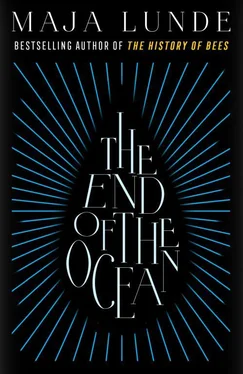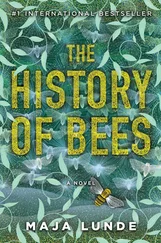We just didn’t wave our wands quickly enough. There weren’t enough of us. The plant was too old, too run-down, too small.
And then… I remembered the flames when the building caught fire. It burned so well, almost brightly. That something that contained so much water could burn so well…
“Where has it been?”
Marguerite was standing over me and pointing at the maps.
“I… um… what do you mean?”
“The maps show where the boat has been, don’t they?”
“Oh. Yes. Maybe they do.”
I glanced down at the map I had lying in front of me.
“This is France.”
“The Atlantic coastline,” she said, and pointed. “Bordeaux is there.”
I opened the folder and took out more maps. They covered every part of the same coastline, overlapping in some places, from Bordeaux via La Rochelle to Brest. Large portions of the maps were white. Ocean, the Bay of Biscay.
“Are there more?” Marguerite asked.
I took out the other plastic folders containing charts, opened the first one, took out four more sheets of paper, tried spreading them out, but they were too large for the tiny saloon table.
“Let’s take them outside,” Marguerite said.
*
Lou helped to spread them across the dry grass in the garden. Marguerite laid overlapping charts on top of each other, showing Lou how they could be fitted together like a puzzle.
There was a slight breeze, the maps fluttered. Lou and Marguerite found stones to hold them down.
I stood there watching. The two bowed heads. Marguerite explaining calmly, Lou talking loudly and eagerly, while the entire western coast of Europe slowly appeared before our eyes on the ground.
“From the north,” Marguerite said finally. “She came from the north. Far north.”
“She?”
“That’s what you call a boat. She’s a woman.”
“But it’s a boat,” Lou said.
Marguerite laughed. I felt a stabbing inside of me. How rusty it sounded, that laughter. As if she wasn’t used to laughing.
“From the north?” I asked.
From the water countries.
I gazed at the maps, following them upwards, the English Channel, Le Havre, Calais, Ostend, Vlissingen, Den Helder, Cuxhaven, Sylt, Esbjerg, Hirtshals, Egersund, Stavanger, Haugesund…
I walked over to the maps of Norway, stopping by the one furthest north.
What a coastline, so different from France. The landscape at home was a straight line facing the ocean compared to this. The Norwegian coast was jagged, fragmented, made up of thousands of islands. And long, dramatic fjords that continued inland for miles.
“We’re here,” Marguerite said, and pointed at a place in the grass, off the charts.
“Where is the ocean?” Lou asked, and looked around her.
“Far, far away,” Marguerite said.
“But how did the boat end up here?” I asked. “In the middle of the countryside?”
“Come.”
Marguerite walked away between the trees. She stopped for a moment. Sunshine and shadows flickered across her face. Then she seemed to notice something between the trees behind the house.
“Here.”
She nodded at us, encouraging us to come along. And we followed her into the tangled underbrush, where she pointed out an almost overgrown cart road.
It followed a dried-up brook, with smoothly polished stones where the bed of the river had once been.
Soon the riverbed sloped downwards. We walked down a gentle incline.
We reached a dilapidated construction beside the riverbed.
Marguerite stopped at the sight of weathered planks and rotting wooden boards.
“What was it?” she said.
I was puzzled. “Didn’t you ever build a dam as a child?”
“No,” she said. “I never built anything.”
No… women like her didn’t build… they didn’t need to—you don’t need to build when you are given everything.
We continued on along the path, and soon the landscape opened up. And there, between the trees, we saw it.
A belt of mud, almost dried out.
“A river?”
“A canal,” Marguerite said. “Canal de Garonne. It continues on to the Canal du Midi. At one time they divided France in two.”
“In two?” Lou said.
“The canals divided France, but connected the oceans, the Atlantic and the Mediterranean.”
“Where is the water now?”
“The canal has dried up. But it will be filled up again if it starts raining.”
“When it starts raining,” I said.
“What?”
“The canal will fill up again when it starts raining.”
Marguerite looked at me, was going to say something.
I stared back at her, hard. She would have to understand this, thank you very much. We couldn’t talk like that around Lou.
She corrected herself.
“ When it starts to rain,” she said to Lou, “the canal will fill up again… all we need is a little rain.”
*
We walked home together, Lou in the middle between us. I suddenly expected her to reach out her hands, one hand for each of us. That she would get us to hoist her into the air. Jump. The way she used to, with Anna and me.
But she walked without taking either of our hands. And that was good. Because she shouldn’t hold hands like that, not with Marguerite.
We passed a tractor. It was parked on the side of the road. Abandoned.
Somebody had vandalized it. Cut up the leather seat with a knife—the foam rubber was spilling out.
Marguerite looked at me, above Lou’s head—was it safe, she was thinking maybe, to walk along these roads alone?
We walked faster, hurrying back to the camp.
“Thank you,” Marguerite said when we arrived. “For letting me see the boat.”
“Yes…” I said.
“You’re welcome,” Lou said.
“Good night,” Marguerite said. “See you.”
“You can come with us tomorrow, too,” Lou said.
“I’m sure she doesn’t want to do that,” I said.
“Don’t you want to?” Lou asked.
“I would like that very much,” Marguerite replied.
*
But she didn’t wait until the next morning.
She came back that very same night.
She was there with her body. The rippling tautness beneath my fingers. The bony softness.
You’re here, I thought.
You’re here, under me, over me.
And I can’t stop myself. See no reason to hold back. I am incapable of thinking about why I should hold back.
Anna was a hole in my head. August and Anna a black hole into which everything disappeared.
But Marguerite filled me up again. A little, a little bit.
We didn’t talk. I wanted to, wanted to know everything about her. Wanted to hear everything.
But we couldn’t talk. Because Lou was sleeping quietly.
We could only lie here. Beneath each other, on top of each other. And I wanted to gasp. Howl. Scream. But I was as quiet as I could be.
While I hoped the hole would shrink.
While I hated that the hole shrank.
No wind. I turn on the engine, sailing at a low rpm. I can hear better then, stand tall, stretch, but I can’t see much.
Thirty-three point one kilometers at the narrowest point, in the strait between Dover and Calais, France on the port side, England on starboard. I stay close to the British coastline to avoid the ferry traffic. It feels like the land along the shore is closing in on me. The wind drops and the fog seeps in, from England of course, the homeland of the fog.
England, England, there you are again. I’ve never been back, have avoided the country, the odor of deep-fried food, cigarette smoke, the aftertaste of brick dust in my mouth, the eyes of the receptionist, am not going there either, not ever, not even if I need a port of refuge. I would rather founder.
Читать дальше










